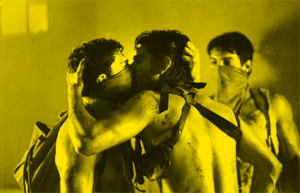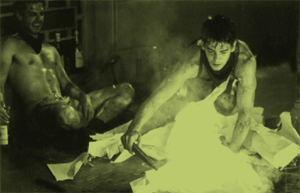
And in love.
Barry and I were totally inside the little screen yesterday afternoon, a part of the film "Burnt Money (Plata Quamada)." It was far more than either of us had expected, and all of the mainstream reviews we had seen earlier seem to have missed the point. It was sexy, hot, beautiful, political, redemptive, claustrophobic, reckless, sweaty, crudely violent, yet barely and rarely innocent and sweet, and very, very elegant.
There is a heartbreaking scene lasting only a few seconds, more than half-way into the film, where the "twins" are filmed from below a balcony in a carnival dance hall. Colorful stips of lights run across the ceiling above the two graceful figures in their suits, caught dancing a slow, elegant tango worthy of the dance's working-class male origins.*
Another very different moment earlier in the story, when Nene calmly removes a bullet from the shoulder of the recumbent Angel, who has refused to take a narcotic (he tells his partner he wants to feel everything) is unbelievably erotic. I know, it sounds awful. You have to be there.
Jason Anderson writes in Eye Weekly:
Based on the real-life exploits of a gang of Argentinian robbers in late 1965, Burnt Money offers a stylish, pulpy combination of sweaty hunks and blazing guns. It's the sort of film that leaves its characters soaked in blood, perspiration, spunk or -- ideally -- all three at once.Anderson concludes his review bluntly, after quoting Piñeyro describing his cinematic influences, "his fevered Burnt Money is a real sweatbox of a movie.". . . .
[The film's director, Marcelo] Piñeyro explains that, in the underworld of Buenos Aires, "homosexuality wasn't -- and isn't -- a cause of rejection, as it was, and probably still is, in the middle classes. Homosexuality wasn't associated with weakness. Besides, homosexuality was part of the life in jail. Nobody in the underworld had prejudices about it."
But the characters' sexual identities are at once open and closeted in the film. One of the most exciting things about Burnt Money is how it inverts the standard pattern of gay relationships on film. The Twins' relationship is transformed from one that is open and sensual into one in which their desires are frustrated and repressed -- with suitably apocalyptic repercussions.
The sweat is dry, but I still feel I'm inside that box.

[thanks to Pagina12 for the images]
____________________
*
The dance was created by men, and men first danced together to sharpen their style, and only then [most?] went out and danced with women.